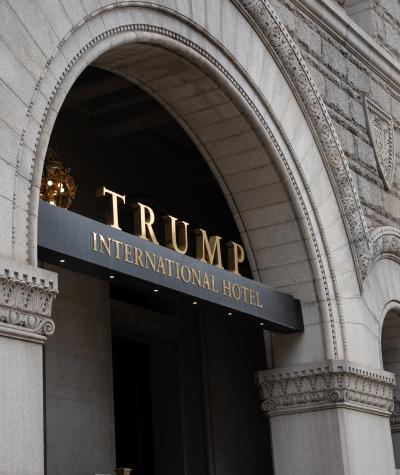In times of crisis and panic, it is vital that Americans can trust leaders to determine what course of action is best for the public’s health and safety. Unfortunately, when the country’s most senior official is riddled with conflicts of interest, it becomes hard to sustain that trust.
As the coronavirus outbreak continues to spread across the U.S., Americans’ lives have been upended. The economy has taken a huge hit as financial markets saw their biggest one-day drop since the stock market crash of 1987. Schools across the country have closed indefinitely and states are even postponing elections. Movement has been restricted and nursing homes have stopped allowing visitors.
The Trump Administration has come under harsh scrutiny for elements of its response to this crisis that seem tailored to benefit President Trump’s personal financial interests. When President Trump took office, he refused to divest from his financial interests, as all other modern presidents had done. Instead, he retained ownership of the Trump Organization while leaving the day-to-day administration of his businesses to his children.
President Trump’s failure to divest from his business interests has caused concern from the start of his administration. But a crisis like the coronavirus pandemic throws his conflicts of interest into sharp relief.
As it became clear major sectors of the economy were facing collapse as supply chains were disrupted and travel was stunted, President Trump stated that he was going considering providing relief aid to the hospitality industry. President Trump specifically addressed the hotel industry:
“We’re also talking to the hotel industry. And some places, actually, will do well, and some places probably won’t do well at all. But we’re working also with the hotel industry.”
A hotel industry bailout raises eyebrows because President Trump’s vast wealth comes in large part from his line of Trump-branded hotels and resorts, which stand to take a financial hit from the reduced travel and tourism caused by the coronavirus pandemic. If the President provides federal aid to the hotel industry, it is possible that he will funnel government money to himself or his family members.
The public should never even have to question whether relief aid is going to the people or industries who most need it or those whose interests most closely align with the president’s personal financial interests.
Another element of the administration’s response to the epidemic was a travel restriction for most of Europe. Curiously absent from the initial travel restrictions were Britain and Ireland. President Trump’s only international hotels and golf courses are located in these two countries, and the hotels have been struggling financially. Any move that restricts tourism to Britain and Ireland and limits the number of people spending money at Trump properties threatens the Trump Organization’s, and therefore President Trump’s, bottom line. A few days after various reports highlighting the conflict of interest, President Trump extended the travel ban to include Britain and Ireland.
Of course, it is impossible to know whether President Trump’s financial interests were actually animating any element of the administration’s response to this crisis. However, the ethics laws that he ignores were established to prevent actual conflicts and the appearance of conflicts because even the appearance has the same negative effect on public trust.
The American public has been put in the impossible position of having to hope that the president’s financial interests do not cloud his judgment for the sake of the nation’s health. The coronavirus crisis is yet another example of the necessity of officials to comply with ethics laws and norms beginning day one of their public service.

